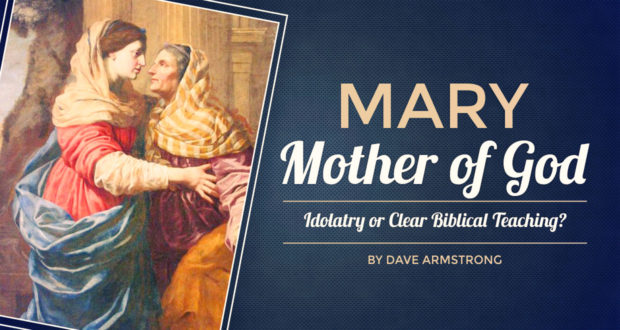A few years back I ran across a woman online who used to be a Baptist and had become a Catholic. She expressed perfectly how the term “Mother of God” is so vastly misunderstood by a good portion of Protestants, in describing how she used to think:
I felt that I was saying that a human being born at a certain time in history (a creature) had “created,” had given life to, God Himself, Who had not previously existed.
Such an outrageous, blasphemous thing was, of course, never the intent of the phrase or title (which goes back to the early Church fathers) in the first place. Given these rather extraordinary misperceptions, it’s always good to clarify: “Mary is the mother of God the Son.” No Christian can argue with that.
The Mother of all Quandaries
If they deny that she is the mother of God (the Son), then they deny that Jesus is God, which they don’t want to do. If, on the other hand, they deny that she is the mother of God (the Son), then they deny the virgin birth, and in effect, also the incarnation, which they don’t want to do, either.
This resolves the problem altogether. The original Greek term Theotokos (literally, “God-bearer”) isn’t in Scripture, but it doesn’t have to be, since Scripture teaches that:
- Jesus is God (many biblical proofs; Jn 1:1; Col 2:9).
- Mary is His true mother (Is 7:14; Mt 1:16,18; 2:11, 13, 20; 12:46; Lk 1:31, 35, 43; Jn 1:15; 2:1; Gal 4:4).
Ergo, “Mary is the Mother of God” (the Son).
Curious about ‘Kurios’
Another, less direct, but equally effective way of arguing the point is noting Elizabeth’s exclamation to the Blessed Virgin Mary: “And why is this granted me, that the mother of my Lord should come to me?” (Luke 1:43, RSV).
The Greek word for “Lord” here (as usually in the New Testament) is Kurios. It’s widely applied both to God the Father and to Jesus, since they are both “Lord” and God” and equal as the Father and Son in the Holy Trinity. In fact, in a single passage, both the Father and the Son are called “Lord” (Kurios):
Romans 10:9-13 because, if you confess with your lips that Jesus is Lord and believe in your heart that God raised him from the dead, you will be saved. [10] For man believes with his heart and so is justified, and he confesses with his lips and so is saved. [11] The scripture says, “No one who believes in him will be put to shame.” [12] For there is no distinction between Jew and Greek; the same Lord is Lord of all and bestows his riches upon all who call upon him. [13] For, “every one who calls upon the name of the Lord will be saved.” (cf. also Mt 22:41-45; Mk 12:36-37; Lk 20:42-44; Acts 2:34)
Romans 10:13 cites Joel 2:32: “And it shall come to pass that all who call upon the name of the LORD shall be delivered;…” Thus, the New Testament applies Old Testament passages about God directly to Jesus, since He is God, and He and His Father are one (Jn 10:30).
Therefore, in calling Mary “mother of my Lord,” Elizabeth is at the same time calling her the “mother of God.” It takes a little digging into Scripture to discover that, but it’s plain and definite biblical teaching: part of the massive biblical evidence of the divinity or deity of Jesus Christ.
What Calvin and Luther Said
John Calvin, the most influential early Protestant leader after Martin Luther, wrote about this passage:
She (Elizabeth) calls Mary the mother of her Lord This denotes a unity of person in the two natures of Christ; as if she had said, that he who was begotten a mortal man in the womb of Mary is, at the same time, the eternal God. (Harmony of the Synoptic Gospels, comment under Luke 1:43)
Martin Luther also made many affirming statements about Theotokos. Here are two of the most striking ones:
We, too, know very well that Christ did not derive his deity from Mary; but it does not follow that it must, therefore, be false to say, “God was born of Mary” and “God is Mary’s Son” and “Mary is God’s mother.”
Mary is the true, natural mother of the child called Jesus Christ, and the true mother and bearer of God . . . Mary suckled God, rocked God, made broth and soup for God. For God and man are one Person, one Christ, one Son, one Jesus, not two persons . . . just as your son is not two sons . . . even though he has two natures, body and soul, — body from you, soul from God alone. (On the Councils and the Church, 1539)

 Seton Magazine Catholic Homeschool Articles, Advice & Resources
Seton Magazine Catholic Homeschool Articles, Advice & Resources
